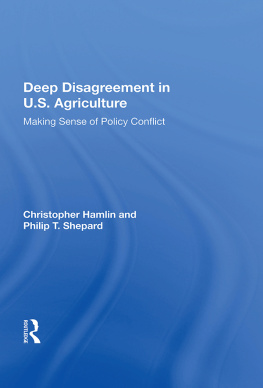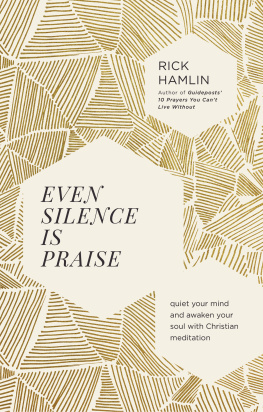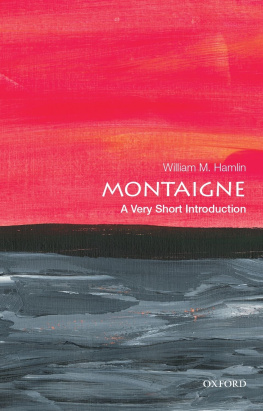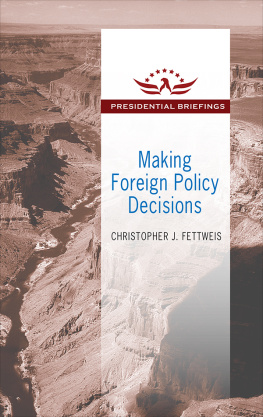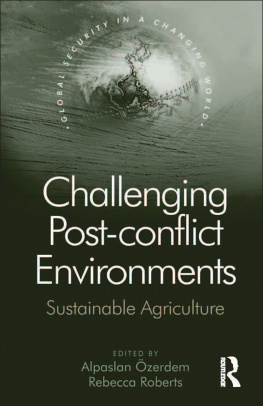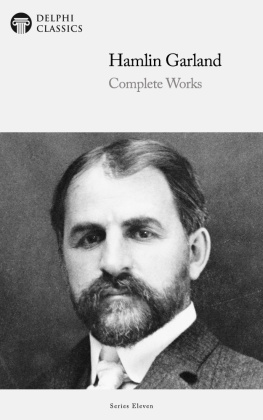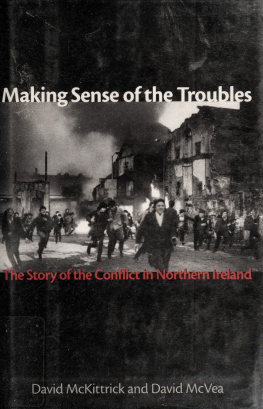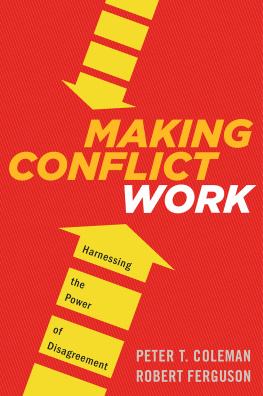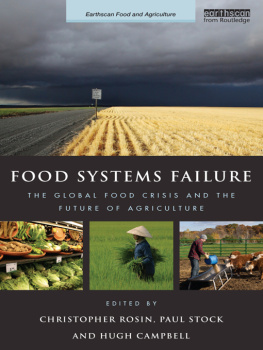Deep Disagreement in U.S. Agriculture
First published 1993 by Westview Press
Published 2018 by Routledge
52 Vanderbilt Avenue, New York, NY 10017
2 Park Square, Milton Park, Abingdon, Oxon OX14 4RN
Routledge is an imprint of the Taylor & Francis Group, an informa business
Copyright 1993 by Taylor & Francis
All rights reserved. No part of this book may be reprinted or reproduced or utilised in any form or by any electronic, mechanical, or other means, now known or hereafter invented, including photocopying and recording, or in any information storage or retrieval system, without permission in writing fromthe publishers.
Notice:
Product or corporate names may be trademarks or registered trademarks, and are used only for identification and explanation without intent to infringe.
Library of Congress Cataloging-in-Publication Data
Hamlin, Christopher, 1951
Deep disagreement in U.S. agriculture: making sense of policy
conflict / by Christopher Hamlin and Philip T. Shepard.
P. cm.
Includes bibliographical references and index.
ISBN 0-8133-8703-5
1. Agriculture and stateUnited States. I. Shepard, Philip T.
II. Title.
HD1761.H358 1993
338.1873dc20
ISBN 13: 978-0-367-01171-0 (hbk)
This is a book about disagreement, particularly the kinds of disagreements that occur today in making policies for science and technology. We use the area of agricultureagricultural research and agricultural policyto exemplify such disagreements because it so richly reflects their range and depth.
Not only is such disagreement commonplace, it is much studied: we know much about alternative philosophies of medicine, that people have a great range of views on environmental and energy policies, and so forth. Indeed, differences of opinion are often seen as a normal and even healthy condition of society. Not only is it well known that a great deal of difference exists; we often think that we know why. People have different views because they occupy different stations in society or have different cultures and backgrounds; they have different interests to defend, different sensibilities and perceptions, or different values and beliefs, some of which may go with their social territory. Such perspectives have prompted a great explosion of writing in the sociology of science and technology in recent decades.
Yet from another point of view it is really quite puzzling that people disagree so much, particularly people within a given culture. In regards to American culture this puzzlement is especially acute since the culture seems to place such great faith in rational means of decision making and seems to draw so heavily on Western traditions of analysis and problem solving that have been cultivated for centuries. After all, the methodswhether of the ethicist, jurist, debater, or scientistare intended to resolve disagreement. How can it be that the more we rely on these methods, the more and deeper our disagreements seem to grow? Are the causes of disagreement so fundamental that reason cannot touch them? that appeals to reason are but deceitful ploys, aimed to legitimate and assert ones own interests above others? How is it that we manage to articulate so much disagreement even while using tools invented to guide us to agreement? One can say that people with different values will use the tools differently, but that only takes us in a circle, for we rarely look closely enough to distinguish the values from the disagreements as a whole.
Indeed, our American faith in reason seems to be matched and perhaps canceled out by a sort of complacencya willingness to accept disagreements as inevitable and incorrigible. Along with the tradition of American individualism has come a sort of disengaged tolerance (or sophomoric relativism) that belies our need to live together and that may not be altogether a good thing. In many policy areas, including agriculture, it has impeded the making of coherent or long-term policies and has led to a politics in which manipulating the agenda is often treated as more important than reaching an understanding. The assumption is that one can reasonably believe whatever one wants to; but the price of such freedom is a heavy onefor when everything is reasonable nothing reasons, nothing serves us to make well the collective or shared choices that we must take or to bridge the differences that divide us and tear apart the social bonds that make it possible to live well together.
The answer, we believe, is not so much to constrict what can be considered legitimate disagreement as to build stronger means for understanding how people manage to disagree, especially when their disagreements are far from ephemeralwhen they are deeply felt, urgently expressed, and acted out in earnest. We need better ways of recognizing and representing the kinds of frameworks of belief and action which people bring with them into the public arenathe languages they use; the sensibilities, assumptions, and modes of argument they draw upon; the kind of authority they claim for their statements. Ideally, as citizens concerned with agriculture, such approaches would allow us to consider more fully and fairly the widening range of voices in public debate, while at the same time avoiding the facile acceptance of all statements and forms of discourse as equally reasonable or equally legitimate whether we understand them or not. In short, our hope is to expand the capacity for critical discussion on matters of agriculture, not by ruling out some participants or denouncing some arguments, but by finding ways to work with multiple frameworks so that people operating within different ones can understand each other better.
This project was made possible by a grant from the National Science Foundation Program on Ethics and Values in Science and Technology (RII-8409919). Any opinions, findings, and conclusions or recommendations expressed here are those of the authors and do not necessarily reflect the views of the Foundation. We are grateful for this support and for additional support from Michigan State University (College of Natural Science and Lyman Briggs School) and The University of Notre Dame, which allowed us to bring the project to completion.
The project has gone on for many years. A great many people have graciously considered and criticized various parts of it in various stages of its evolution. However fully or sparsely they may find their concerns reflected in the final manuscript, the points they made were invariably well taken, and led us repeatedly to rethink and refine various parts of the work. Among these people are: Gerald Berk, Richard J. Bernstein, Frederick H. Buttel, Kenneth A. Dahlberg, David B. Danbom, Stanislaus J. Dundon, Russel W. Erickson, Craig K. Harris, Richard R. Harwood, Richard P. Haynes, Glenn L. Johnson, Les Levidow, John Lyon, Robert McKinley, Everett Mendelsohn, Denton E. Morrison, Alven Neiman, Basil OLeary, Dorinda Outram, Norman Pollack, Vernon W. Ruttan, Joel Schor, Harold Schwarzweller, Charles Walters jr, Ernie Yanarella, and I. Garth Youngberg. We wish to thank all of these people, any others we may have inadvertently omitted, and especially those who committed considerable amounts of their time to careful and thorough critiques of substantial drafts of the book. Their thoughtful criticism has made this a much better work than it would otherwise have been. We also thank Sharon Powers for access to sources otherwise unavailable.

